ratherthan用法集锦.pdf
- 格式:pdf
- 大小:17.41 KB
- 文档页数:2
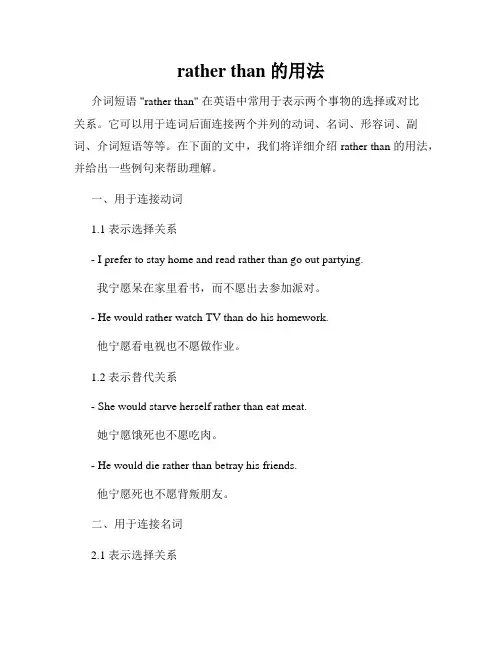
rather than 的用法介词短语 "rather than" 在英语中常用于表示两个事物的选择或对比关系。
它可以用于连词后面连接两个并列的动词、名词、形容词、副词、介词短语等等。
在下面的文中,我们将详细介绍 rather than 的用法,并给出一些例句来帮助理解。
一、用于连接动词1.1 表示选择关系- I prefer to stay home and read rather than go out partying.我宁愿呆在家里看书,而不愿出去参加派对。
- He would rather watch TV than do his homework.他宁愿看电视也不愿做作业。
1.2 表示替代关系- She would starve herself rather than eat meat.她宁愿饿死也不愿吃肉。
- He would die rather than betray his friends.他宁愿死也不愿背叛朋友。
二、用于连接名词2.1 表示选择关系- John decided to buy a used car rather than a new one.约翰决定买一辆二手车,而不是一辆新车。
- She enjoys gardening rather than shopping.她喜欢园艺,而不是购物。
2.2 表示替代关系- He is a writer rather than a musician.他是个作家,而不是音乐家。
- I prefer tea rather than coffee.我更喜欢茶,而不是咖啡。
三、用于连接形容词3.1 表示选择关系- She is quiet rather than talkative.她比较安静,而不是健谈。
- I am feeling tired rather than energetic today.今天我感觉比较疲倦,而不是精力充沛。
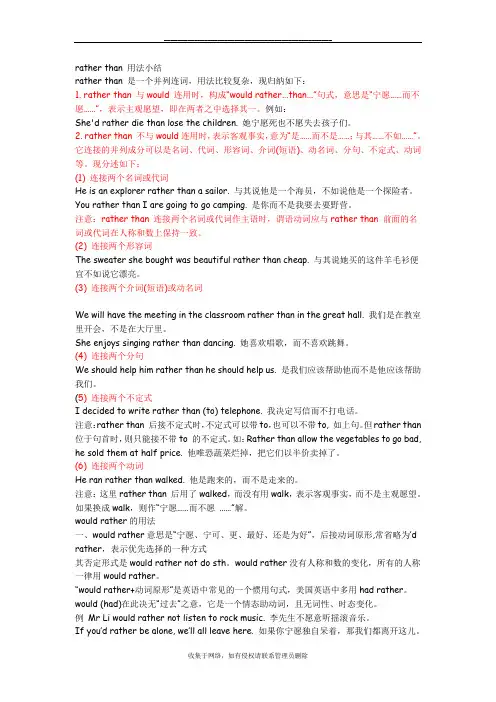
rather than 用法小结rather than 是一个并列连词,用法比较复杂,现归纳如下:1. rather than 与would 连用时,构成“would rather...than...”句式,意思是“宁愿……而不愿……”,表示主观愿望,即在两者之中选择其一。
例如:She'd rather die than lose the children. 她宁愿死也不愿失去孩子们。
2. rather than 不与would连用时,表示客观事实,意为“是……而不是……;与其……不如……”。
它连接的并列成分可以是名词、代词、形容词、介词(短语)、动名词、分句、不定式、动词等。
现分述如下:(1) 连接两个名词或代词He is an explorer rather than a sailor. 与其说他是一个海员,不如说他是一个探险者。
You rather than I are going to go camping. 是你而不是我要去要野营。
注意:rather than 连接两个名词或代词作主语时,谓语动词应与rather than 前面的名词或代词在人称和数上保持一致。
(2) 连接两个形容词The sweater she bought was beautiful rather than cheap. 与其说她买的这件羊毛衫便宜不如说它漂亮。
(3) 连接两个介词(短语)或动名词We will have the meeting in the classroom rather than in the great hall. 我们是在教室里开会,不是在大厅里。
She enjoys singing rather than dancing. 她喜欢唱歌,而不喜欢跳舞。
(4) 连接两个分句We should help him rather than he should help us. 是我们应该帮助他而不是他应该帮助我们。
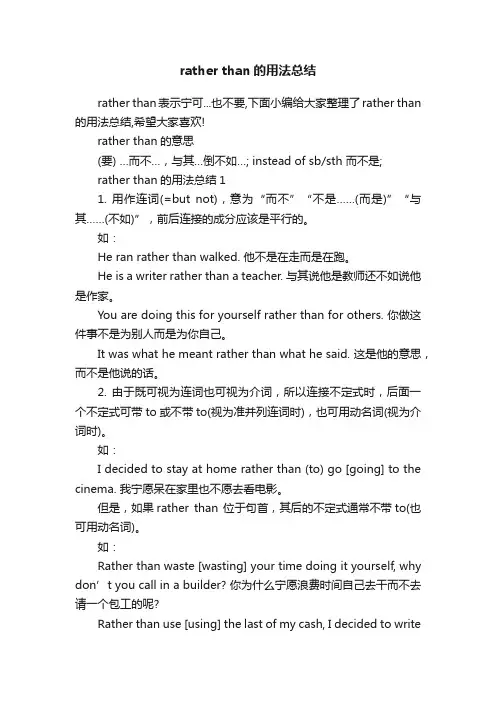
rather than的用法总结rather than表示宁可...也不要,下面小编给大家整理了rather than 的用法总结,希望大家喜欢!rather than的意思(要) …而不…,与其…倒不如…; instead of sb/sth 而不是;rather than的用法总结11. 用作连词(=but not),意为“而不”“不是……(而是)”“与其……(不如)”,前后连接的成分应该是平行的。
如:He ran rather than walked. 他不是在走而是在跑。
He is a writer rather than a teacher. 与其说他是教师还不如说他是作家。
You are doing this for yourself rather than for others. 你做这件事不是为别人而是为你自己。
It was what he meant rather than what he said. 这是他的意思,而不是他说的话。
2. 由于既可视为连词也可视为介词,所以连接不定式时,后面一个不定式可带to或不带to(视为准并列连词时),也可用动名词(视为介词时)。
如:I decided to stay at home rather than (to) go [going] to the cinema. 我宁愿呆在家里也不愿去看电影。
但是,如果rather than 位于句首,其后的不定式通常不带to(也可用动名词)。
如:Rather than waste [wasting] your time doing it yourself, why don’t you call in a builder? 你为什么宁愿浪费时间自己去干而不去请一个包工的呢?Rather than use [using] the last of my cash, I decided to writea cheque. 我决定开张支票而不把现金用光。
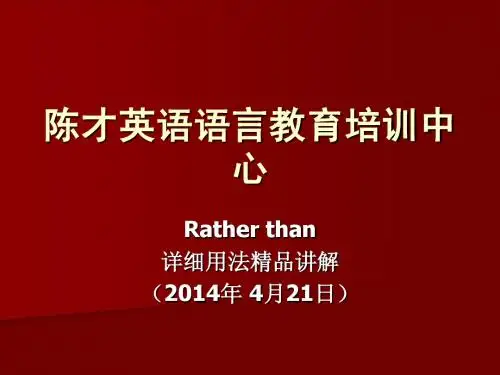
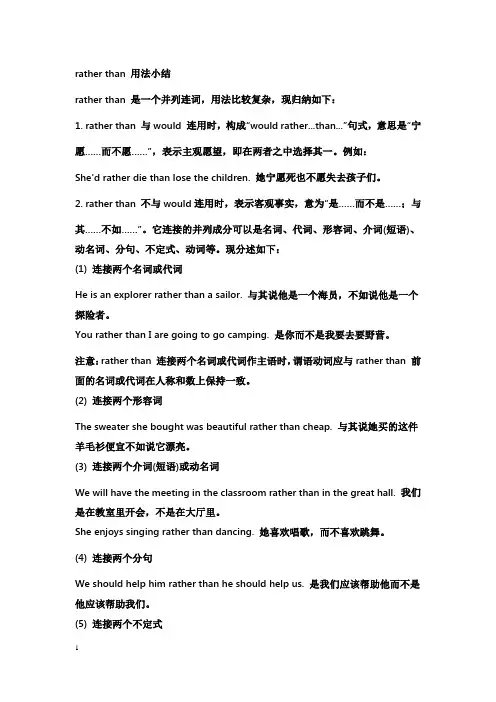
rather than 用法小结rather than 是一个并列连词,用法比较复杂,现归纳如下:1. rather than 与would 连用时,构成“would rather...than...”句式,意思是“宁愿……而不愿……”,表示主观愿望,即在两者之中选择其一。
例如:She'd rather die than lose the children. 她宁愿死也不愿失去孩子们。
2. rather than 不与would连用时,表示客观事实,意为“是……而不是……;与其……不如……”。
它连接的并列成分可以是名词、代词、形容词、介词(短语)、动名词、分句、不定式、动词等。
现分述如下:(1) 连接两个名词或代词He is an explorer rather than a sailor. 与其说他是一个海员,不如说他是一个探险者。
You rather than I are going to go camping. 是你而不是我要去要野营。
注意:rather than 连接两个名词或代词作主语时,谓语动词应与rather than 前面的名词或代词在人称和数上保持一致。
(2) 连接两个形容词The sweater she bought was beautiful rather than cheap. 与其说她买的这件羊毛衫便宜不如说它漂亮。
(3) 连接两个介词(短语)或动名词We will have the meeting in the classroom rather than in the great hall.我们是在教室里开会,不是在大厅里。
She enjoys singing rather than dancing. 她喜欢唱歌,而不喜欢跳舞。
(4) 连接两个分句We should help him rather than he should help us. 是我们应该帮助他而不是他应该帮助我们。
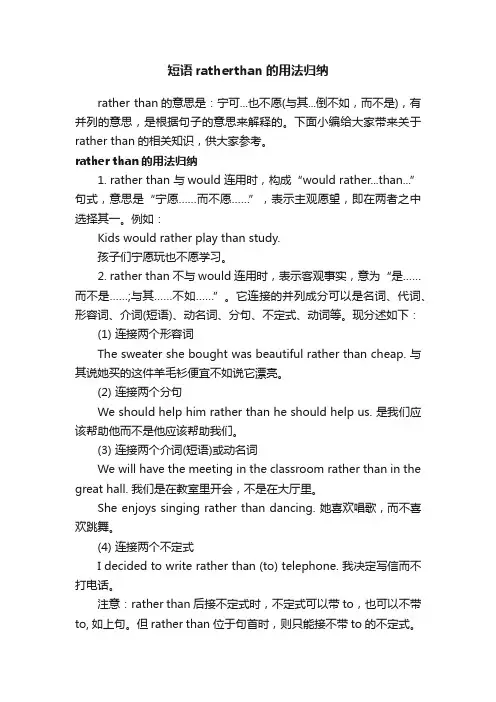
短语ratherthan的用法归纳rather than的意思是:宁可...也不愿(与其...倒不如,而不是),有并列的意思,是根据句子的意思来解释的。
下面小编给大家带来关于rather than的相关知识,供大家参考。
rather than的用法归纳1. rather than 与would 连用时,构成“would rather...than...”句式,意思是“宁愿……而不愿……”,表示主观愿望,即在两者之中选择其一。
例如:Kids would rather play than study.孩子们宁愿玩也不愿学习。
2. rather than 不与would连用时,表示客观事实,意为“是……而不是……;与其……不如……”。
它连接的并列成分可以是名词、代词、形容词、介词(短语)、动名词、分句、不定式、动词等。
现分述如下:(1) 连接两个形容词The sweater she bought was beautiful rather than cheap. 与其说她买的这件羊毛衫便宜不如说它漂亮。
(2) 连接两个分句We should help him rather than he should help us. 是我们应该帮助他而不是他应该帮助我们。
(3) 连接两个介词(短语)或动名词We will have the meeting in the classroom rather than in the great hall. 我们是在教室里开会,不是在大厅里。
She enjoys singing rather than dancing. 她喜欢唱歌,而不喜欢跳舞。
(4) 连接两个不定式I decided to write rather than (to) telephone. 我决定写信而不打电话。
注意:rather than 后接不定式时,不定式可以带to,也可以不带to, 如上句。
但rather than位于句首时,则只能接不带to 的不定式。
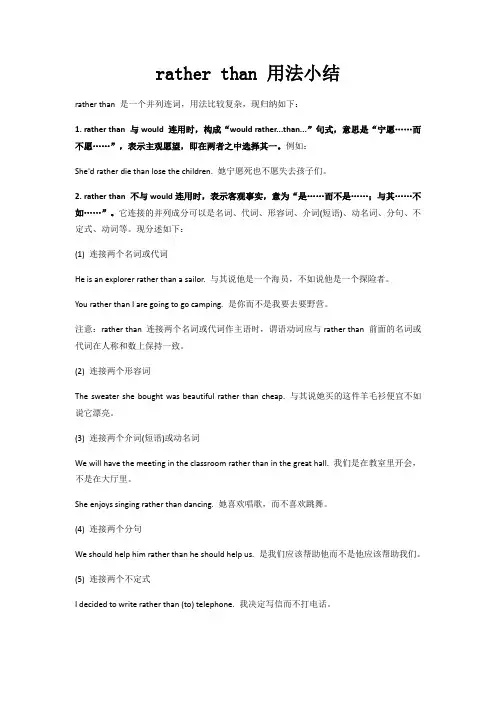
rather than 用法小结rather than 是一个并列连词,用法比较复杂,现归纳如下:1. rather than 与would 连用时,构成“would rather...than...”句式,意思是“宁愿……而不愿……”,表示主观愿望,即在两者之中选择其一。
例如:She'd rather die than lose the children. 她宁愿死也不愿失去孩子们。
2. rather than 不与would连用时,表示客观事实,意为“是……而不是……;与其……不如……”。
它连接的并列成分可以是名词、代词、形容词、介词(短语)、动名词、分句、不定式、动词等。
现分述如下:(1) 连接两个名词或代词He is an explorer rather than a sailor. 与其说他是一个海员,不如说他是一个探险者。
You rather than I are going to go camping. 是你而不是我要去要野营。
注意:rather than 连接两个名词或代词作主语时,谓语动词应与rather than 前面的名词或代词在人称和数上保持一致。
(2) 连接两个形容词The sweater she bought was beautiful rather than cheap. 与其说她买的这件羊毛衫便宜不如说它漂亮。
(3) 连接两个介词(短语)或动名词We will have the meeting in the classroom rather than in the great hall. 我们是在教室里开会,不是在大厅里。
She enjoys singing rather than dancing. 她喜欢唱歌,而不喜欢跳舞。
(4) 连接两个分句We should help him rather than he should help us. 是我们应该帮助他而不是他应该帮助我们。
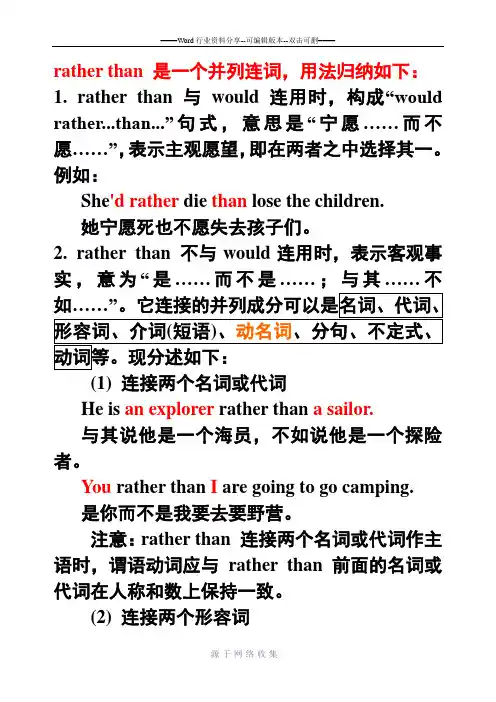
rather than 是一个并列连词,用法归纳如下:1. rather than 与would 连用时,构成“would rather...than...”句式,意思是“宁愿……而不愿……”,表示主观愿望,即在两者之中选择其一。
例如:She'd rather die than lose the children.她宁愿死也不愿失去孩子们。
2. rather than 不与would连用时,表示客观事实,意为“是……而不是……;与其……不(1) 连接两个名词或代词He is an explorer rather than a sailor.与其说他是一个海员,不如说他是一个探险者。
You rather than I are going to go camping.是你而不是我要去要野营。
注意:rather than 连接两个名词或代词作主语时,谓语动词应与rather than 前面的名词或代词在人称和数上保持一致。
(2) 连接两个形容词The sweater was beautiful rather than cheap.与其说这件羊毛衫便宜不如说它漂亮。
(3) 连接两个介词(短语)或V-ingWe will have the meeting in the classroom rather than in the great hall.我们是在教室里开会,不是在大厅里。
She enjoys singing rather than dancing.她喜欢唱歌,而不喜欢跳舞。
(4) 连接两个分句We should help him rather than he should help us. 是我们应该帮助他而不是他应该帮助我们。
(5) 连接两个不定式I decided to write rather than (to) telephone. 我决定写信而不打电话。
注意:rather than 后接不定式时,不定式可以带to,也可以不带to, 如上句。
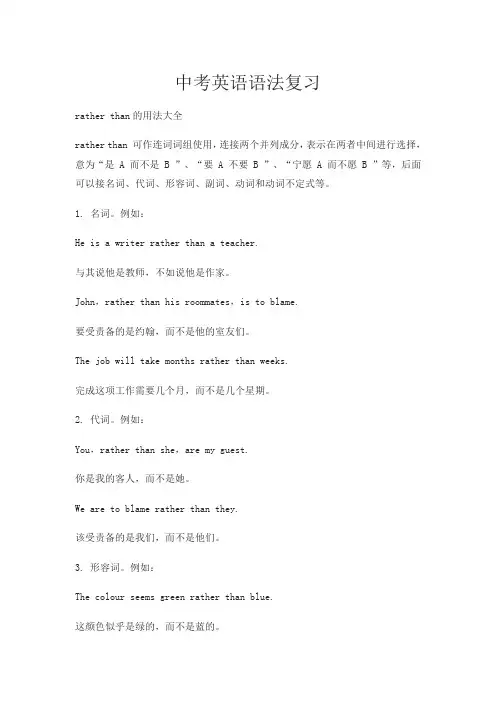
中考英语语法复习rather than的用法大全rather than 可作连词词组使用,连接两个并列成分,表示在两者中间进行选择,意为“是 A 而不是 B ”、“要 A 不要 B ”、“宁愿 A 而不愿 B ”等,后面可以接名词、代词、形容词、副词、动词和动词不定式等。
1. 名词。
例如:He is a writer rather than a teacher.与其说他是教师,不如说他是作家。
John,rather than his roommates,is to blame.要受责备的是约翰,而不是他的室友们。
The job will take months rather than weeks.完成这项工作需要几个月,而不是几个星期。
2. 代词。
例如:You,rather than she,are my guest.你是我的客人,而不是她。
We are to blame rather than they.该受责备的是我们,而不是他们。
3. 形容词。
例如:The colour seems green rather than blue.这颜色似乎是绿的,而不是蓝的。
It was made shorter rather than longer.它被缩短了,而不是加长了。
These shoes are comfortable rather than pretty.这些鞋子与其说漂亮,不如说舒服。
4. 副词。
例如:The ship sank quickly rather than slowly.船沉得很快,而不是很慢。
He usually gets up early rather than late.他经常起得早,而不是起得晚。
5. 动词。
例如:She left rather than stayed at home.她不是呆在家里,而是走了。
Rather than cause trouble,he went away.他宁可走开而不愿惹麻烦。
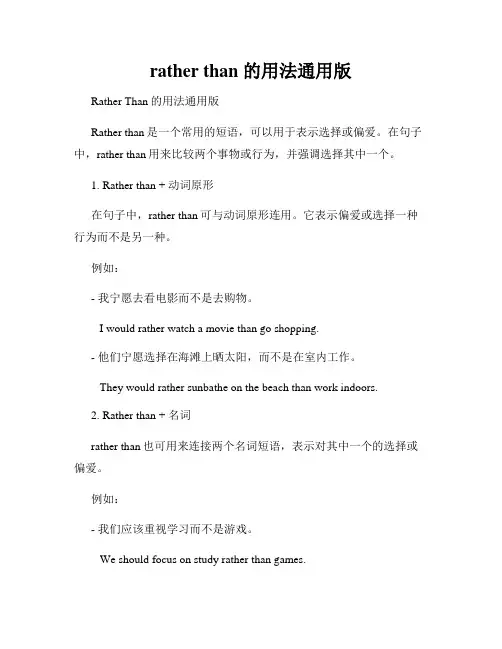
rather than 的用法通用版Rather Than的用法通用版Rather than是一个常用的短语,可以用于表示选择或偏爱。
在句子中,rather than用来比较两个事物或行为,并强调选择其中一个。
1. Rather than + 动词原形在句子中,rather than可与动词原形连用。
它表示偏爱或选择一种行为而不是另一种。
例如:- 我宁愿去看电影而不是去购物。
I would rather watch a movie than go shopping.- 他们宁愿选择在海滩上晒太阳,而不是在室内工作。
They would rather sunbathe on the beach than work indoors.2. Rather than + 名词rather than也可用来连接两个名词短语,表示对其中一个的选择或偏爱。
例如:- 我们应该重视学习而不是游戏。
We should focus on study rather than games.- 她更喜欢蓝色而不是红色。
She prefers blue rather than red.3. Rather than + 名词从句rather than也可以连接两个名词从句,用来表示选择或偏爱某一种条件或情况。
例如:- 他们宁愿接受困难的挑战,而不是保持平安无事。
They would rather face difficult challenges than remain safe and sound.- 这个国家更愿意发展绿色能源而不是依赖化石燃料。
The country would rather develop green energy than rely on fossil fuels.4. Rather than的替代结构除了rather than,我们还可以使用instead of来表示“而不是”的意思。
这两个短语在用法上基本相同。
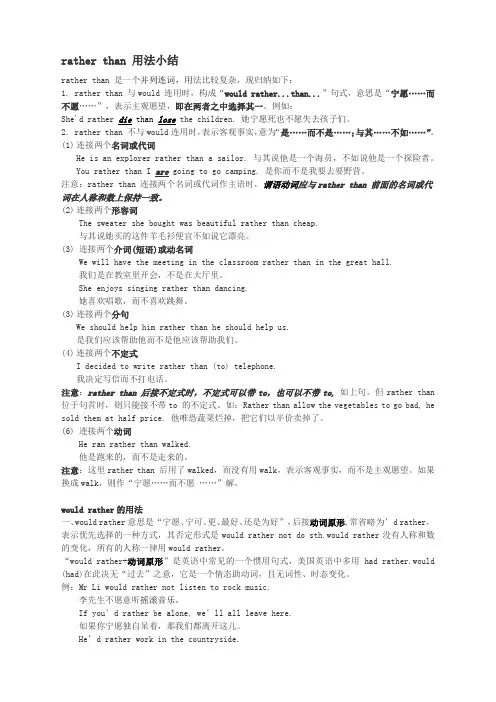
rather than 用法小结rather than 是一个并列连词,用法比较复杂,现归纳如下:1. rather than 与would 连用时,构成“would rather...than...”句式,意思是“宁愿……而不愿……”,表示主观愿望,即在两者之中选择其一。
例如:She'd rather die than lose the children. 她宁愿死也不愿失去孩子们。
2. rather than 不与would连用时,表示客观事实,意为“是……而不是……;与其……不如……”。
(1)连接两个名词或代词He is an explorer rather than a sailor. 与其说他是一个海员,不如说他是一个探险者。
You rather than I are going to go camping. 是你而不是我要去要野营。
注意:rather than 连接两个名词或代词作主语时,谓语动词应与rather than 前面的名词或代词在人称和数上保持一致。
(2)连接两个形容词The sweater she bought was beautiful rather than cheap.与其说她买的这件羊毛衫便宜不如说它漂亮。
(3) 连接两个介词(短语)或动名词We will have the meeting in the classroom rather than in the great hall.我们是在教室里开会,不是在大厅里。
She enjoys singing rather than dancing.她喜欢唱歌,而不喜欢跳舞。
(3)连接两个分句We should help him rather than he should help us.是我们应该帮助他而不是他应该帮助我们。
(4)连接两个不定式I decided to write rather than (to) telephone.我决定写信而不打电话。
rather than的用法与搭配
than是一个连接副词,用来连接并列的成分。
在句中用于进行比较、对比或权衡等比较性的表达时最为常见。
一、rather than的用法
1. rather than作为连词,用来表示转折,意思是“而不是”。
常用句型为:主语+rather than+动词宾语/不定式/从句。
例句:
She chose to read books rather than watch television.
她选择读书而不是看电视。
2. rather than另一常见用法是放于句首,表达强调的意思,相当于and not。
例句:
Rather than staying at home, I prefer to go out to see some friends.
我宁愿出去见几个朋友,而不愿意呆在家里。
二、rather than的搭配
常见的搭配有:
1. do something rather than do something else
选择做某事而不做另一件事
例句:
I would rather buy a new dress rather than repair the old one. 我宁愿买一件新衣服,而不愿修补旧衣服。
2. choose to do something rather than doing something else 选择做某事而不做另一件事
例句:
He chose to study medicine rather than engineering. 他选择学医学而不是学工程学。
rather than 用法总结rather than 是一个并列连词,用法比较复杂,现归纳如下:1. rather than 与would 连用时,构成“would rather...than...”句式,意思是“宁愿……而不愿……”,表示主观愿望,即在两者之中选择其一。
例:She'd rather die than lose the children. 她宁愿死也不愿失去孩子们。
2. rather than 不与would连用时,表示客观事实,意为“是……而不是……;与其……不如……”。
它连接的并列成分可以是名词、代词、形容词、介词(短语)、动名词、分句、不定式、动词等。
现分述如下:(1) 连接两个名词或代词He is an explorer rather than a sailor. 与其说他是一个海员,不如说他是一个探险者。
You rather than I are going to go camping. 是你而不是我要去要野营。
注意:rather than 连接两个名词或代词作主语时,谓语动词应与rather than 前面的名词或代词在人称和数上保持一致。
(2) 连接两个形容词The sweater she bought was beautiful rather than cheap.与其说她买的这件羊毛衫便宜不如说它漂亮。
(3) 连接两个介词(短语)或动名词We will have the meeting in the classroom rather than in the great hall.我们是在教室里开会,不是在大厅里。
She enjoys singing rather than dancing.她喜欢唱歌,而不喜欢跳舞。
(4) 连接两个分句We should help him rather than he should help us.是我们应该帮助他而不是他应该帮助我们。
rather than的例句用法rather than的例句用法:rather than 可作连词词组使用,连接两个并列成分,表示在两者中间进行选择,意为“是A 而不是B ”、“要A 不要B ”、“宁愿A 而不愿B ”等,后面可以接名词、代词、形容词、副词、动词和动词不定式等。
1. rather than作名词。
例如:He is a writer rather than a teacher.与其说他是教师,不如说他是作家。
2. rather than作代词。
例如:You,rather than she,are my guest.你是我的客人,而不是她。
3. rather than作形容词。
例如:The colour seems green rather than blue.这颜色似乎是绿的,而不是蓝的。
4. rather than作副词。
例如:The ship sank quickly rather than slowly.船沉得很快,而不是很慢。
5. rather than作动词。
例如:She left rather than stayed at home.她不是呆在家里,而是走了。
6. rather than作介词短语。
例如:I’d prefer to read in the library rather than at home. 我宁愿在图书馆看书,也不愿在家里看书。
7. rather than动词的- ing 形式。
例如:She likes dancing rather than singing.她喜欢跳舞,而不喜欢唱歌。
8. rather than作过去分词。
例如:He had the house rebuilt rather than repaired.他宁愿重建房子,而不愿修缮。
9. rather than句子。
例如:We should help him rather than he should help us. 我们应该帮助他,而不是他应该帮助我们。
浅谈rather than的用法rather than 意为“而不是"、“而没有",侧重客观上的差别,还可以表示“与其……,倒不如(或宁可)……”,侧重句子主语或说话人主观上的选择。
句中rather than 前后一般应为名词、代词、动名词、形容词、谓语动词、动词不定式、介词短语,甚至分句等。
下面分别举例说明。
一、接名词1.He is an artist ratherthan apolitician。
他是位艺术家,而不是政治家。
(与其说他是政治家,倒不如说他是艺术家。
)2. Weought toinvestin newmachineryratherthan building。
我们该在新机器上而不是在建筑上投资。
3。
Whatattracted himisher personality rather than herbeauty。
吸引他的是她的人格魅力,而不是她的美貌.二、接代词1。
It ought to be merather than youthat signthe letter。
在信上签名的该是我,而不是你。
2。
The person who should be praised isyourather than me.该受到表扬的人是你,而不是我。
三、接动名词1. I always prefer getting up early rather than going to school without breakfast。
我总是愿意早起床,而不愿不吃早饭就去上学。
2. He enjoys reading rather than watchingTV.他喜欢读书而不喜欢看电视。
3。
He was engagedin writing ratherthanreading the newspaper。
他在忙着写东西,而不是在看报纸.四、接形容词1。
I callher hair chestnut rather than brown。
英语中rather than 用法要点1. 用作连词(=but not),意为“而不”“不是……(而是)”“与其……(不如)”,前后连接的成分应该是平行的。
如:He ran rather than walked. 他不是在走而是在跑。
He is a writer rather than a teacher. 与其说他是教师还不如说他是作家。
You are doing this for yourself rather than for others. 你做这件事不是为别人而是为你自己。
It was what he meant rather than what he said. 这是他的意思,而不是他说的话。
2. 由于既可视为连词也可视为介词,所以连接不定式时,后面一个不定式可带to或不带to(视为准并列连词时),也可用动名词(视为介词时)。
如:I decided to stay at home rather than (to) go [going] to the cinema. 我宁愿呆在家里也不愿去看电影。
但是,如果rather than 位于句首,其后的不定式通常不带to(也可用动名词)。
如:Rather than waste [wasting] your time doing it yourself, why don't you call in a builder? 你为什么宁愿浪费时间自己去干而不去请一个包工的呢?Rather than use [using] the last of my cash, I decided to write a cheque. 我决定开张支票而不把现金用光。
3. 连接两个成分作主语时,其谓语动词的数通常与前面一个主语保持一致。
如:The teacher rather than the students is to blame. 应受责备的是老师而不是学生。
rather than用法集锦
rather than用作连词,连接两个平行结构。
既可以表示主观愿望上的决择,“与其…宁可…”,也可以表示客观程度上的差异,“与其说是…不如说是…”。
例如:
(1)接代词
I, rather than you, should do the work. 该做这工作的是我,而不是你。
She rather than I is going there. 是她而不是我讲去那里.
(2)接名词
John ought to go rather than Jean.约翰比琴更应该去。
I think I'll have a cold drink rather than coffee. 我想我该要一杯冷饮,而不要咖啡。
(3)接形容词
These shoes are comfortable rather than for your friend. 这鞋不好看可是舒服。
You are doing this for yourself rather than for your friend. 你不是为你朋友,而是为你自己做这
种事。
(4)接介词短语
I'd prefer to go in August rather than in July.我愿8月去不愿7月去。
He is at school rather than at home .他是在学校而不是在家。
(5)接动名词
He always prefer starting early ,rather than leaving everything to the last minute, 他总是愿意早开始而不愿意把所有事情都留到最后才做。
She likes swimming rather than playing tennis .她喜欢游泳而不喜欢打网球。
(6)接过去分词
She insisted on having the room papered rather than painted. 她坚持要用纸裱糊房间,而不是
把房间粉刷一下。
I’d like to be taken there rather than left here. 我宁愿被带往那儿而不愿意被留下来。
(7)接不定式
I decided to write rather than telephone.我决定写信而不是打电话。
They prefer to die fighting rather than live in enslavement. 他们宁可战死,也不肯活着受奴役。
(8)接谓语动词
He told a lie rather than get his friend into trouble. 他宁愿说谎也不愿连累朋友。
He ran rather than walked.他跑步而不是步行。
【温馨提示】rather than后接动词原形表示主观抉择,接一个动词的过去式则表示客观差异。
(9)接从句
It was what he meant rather than what he said. 那是指他话中的意思,而不是他所说的话。
It was what he had eaten rather than what he had drunk that made him ill.使他得病的不是他喝的
东西,而是他吃的东西。
[用法拓展1]
rather than 构成的句型结构:
prefer to do ... rather than do ... 宁可做。
而不愿意做
宁可做。
而不愿意做
would do ... r ather than do…
would rather do sth. than do ... 宁可做。
而不愿意做
例如
I prefer to get up early rather than go to school without breakfast.我宁可早起也不愿意不吃
饭上学.
I would die rather than disgrace myself.我宁死不屈.
He would rather paint the wall on his own than have the painter do it. 他宁愿自己刷这墙也不愿意请油漆工刷.
[温馨提示]
would rather do sth. than do ... prefer to do ... rather than do .../ would do ... rather than do…/
中,rather than 后面都接动词原形.
[用法拓展2]
rather than用作介词,和as well as及in stead of一样,rather than后面跟一个和母句中的
动词形式并不匹配的ing分词分句时,它是介词,而不是准并列连词:
rather than用作从属连词,引导一种优选分句。
例如:
Their actions precipitated the war rather than averting it. 他们的行为促使战争爆发而不是避免
战争。
Rather than a new car, he bought a color television. 他买了一台彩电,而不是一辆新车。
I would rather have noodles than rice. 我宁愿吃面条也不吃米饭。
He would rather drink wine than beer.他喜欢喝红葡萄酒而不喜欢喝啤酒。
Rather than work in such bad condition, he would give up. 与其在这样差的条件下工作,他宁愿放弃。
【温馨提示】 A rather than B 作主语,谓语要与A在人称,数上保持一致性.例如:
He rather than you is wrong .是他而不是你错了.
Tom rather than his friends have been chosen. 是汤姆而不是他的朋友们被选中.。